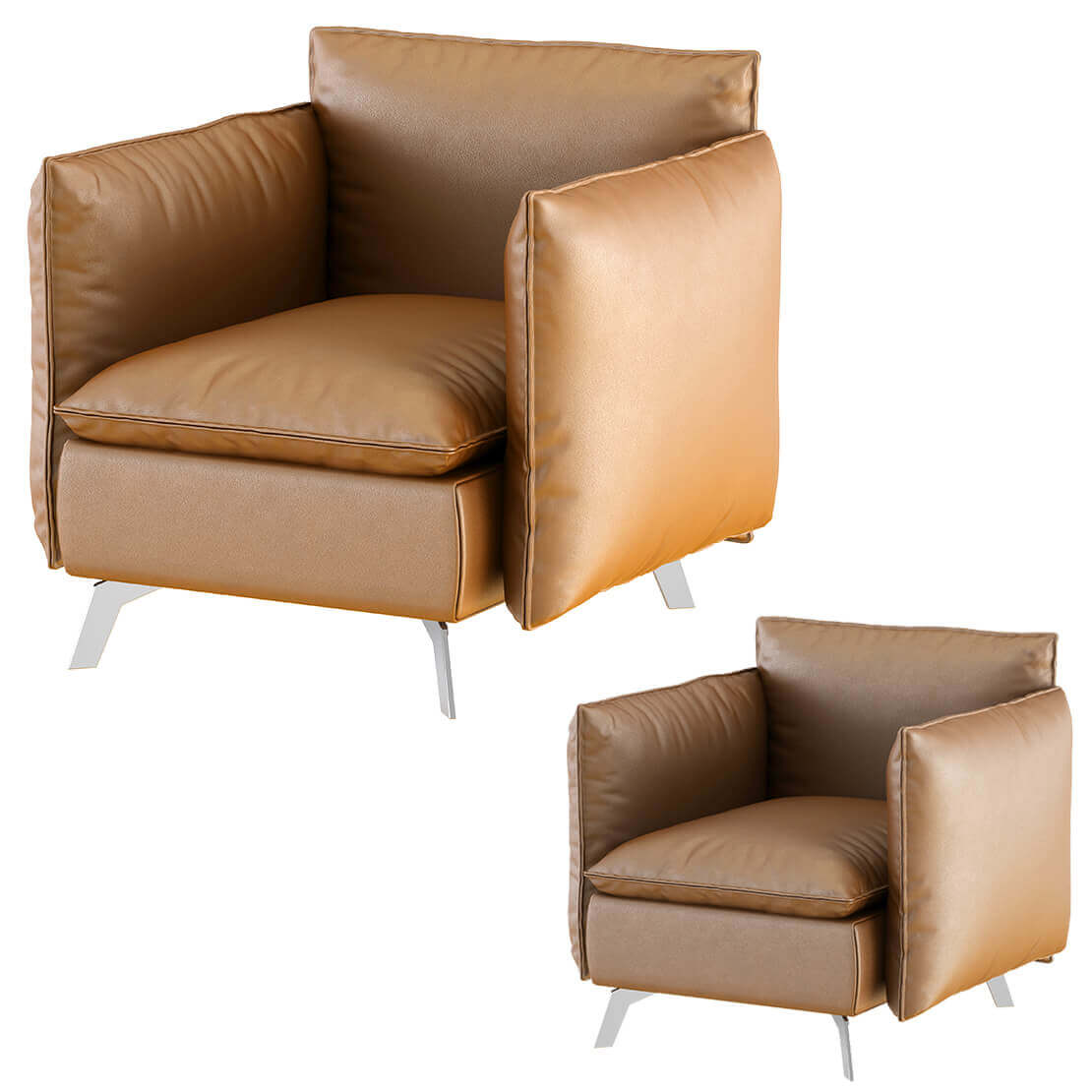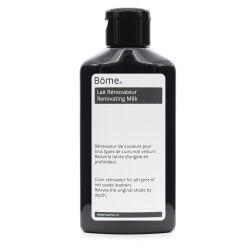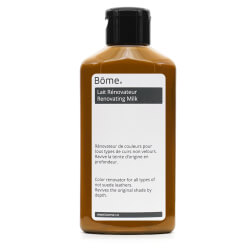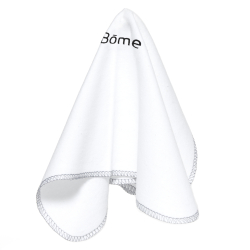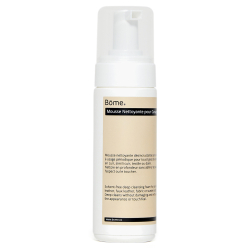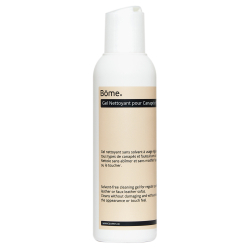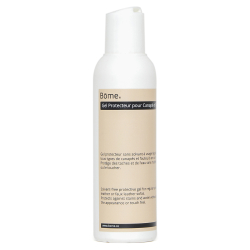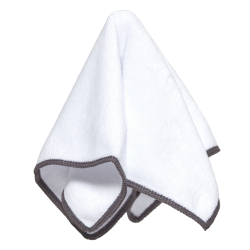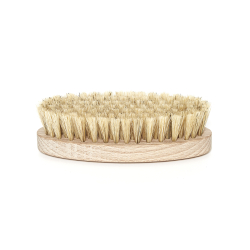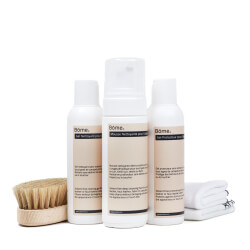Cleaning and protecting your leather sofa
The products can be applied to all types of leather on your sofas and armchairs. The cleaning foam can also be applied to the fabric.
In this lesson, we explain how to use leather care products to maintain and protect your sofas.
The products used are from the Bōme sofa care range.
Introduction
The leathers used to make sofas and armchairs have a different finish from the leathers used in the shoe and leather goods industry.
The leathers used in furniture are pigmented leather or so-called natural leather.
Pigmented leathers are coated with a covering layer of dye. This layer forms a film that makes the surface waterproof and resistant to damage. The objective of our lesson with this type of leather is to succeed in cleaning and protecting it without damaging the surface. This surface is fragile because it cannot be repaired without changing its appearance.
Leather with a so-called natural or aniline finish does not have a dye layer. This type of leather is maintained with products that penetrate the leather to nourish it and protect it from external aggression.
There is a quick test you can do at home to distinguish between these two types of leather. Spread a drop of water with your finger on your sofa. See how your leather reacts:
- If it absorbs quickly (in less than 2 seconds) then it is natural, aniline, or semi-aniline leather.
- If the leather on your sofa does not absorb or absorbs very slowly (more than 10 seconds) then you have pigmented leather.
We offer a range of products and a care routine suitable for both types of leather described. Our products can clean, maintain and protect sofa and armchair leather without the risk of damaging, greasing, or shining.
Clean (with gel)
Two different types of cleaners can be used to clean your leather sofa: the cleaning gel or the scrubbing foam.
We recommend the use of the cleaning gel, to clean a leather sofa regularly and easily.
After dusting the surface with your cleaning brush, take a generous dab of cleaning gel from your chamois. Apply it to the leather to be cleaned. There are two steps to cleaning:
- First, apply the gel by gently massaging the leather to dissolve as many stains and dirt as possible. The gel starts to pick up all the dirt.
- The second step is to massage intensively to loosen the dirt residue from the surface. The cleaning gel will finish mixing with the dirt to dissolve it.
The use of chamois cloth is highly recommended as its absorbent property allows it to absorb this gel/dirt mixture. It, therefore, leaves the surface completely clean.
After this cleaning phase, the leather will have the appearance of a soft, mat surface, unlike the initial shine caused by time or the use of the wrong products.
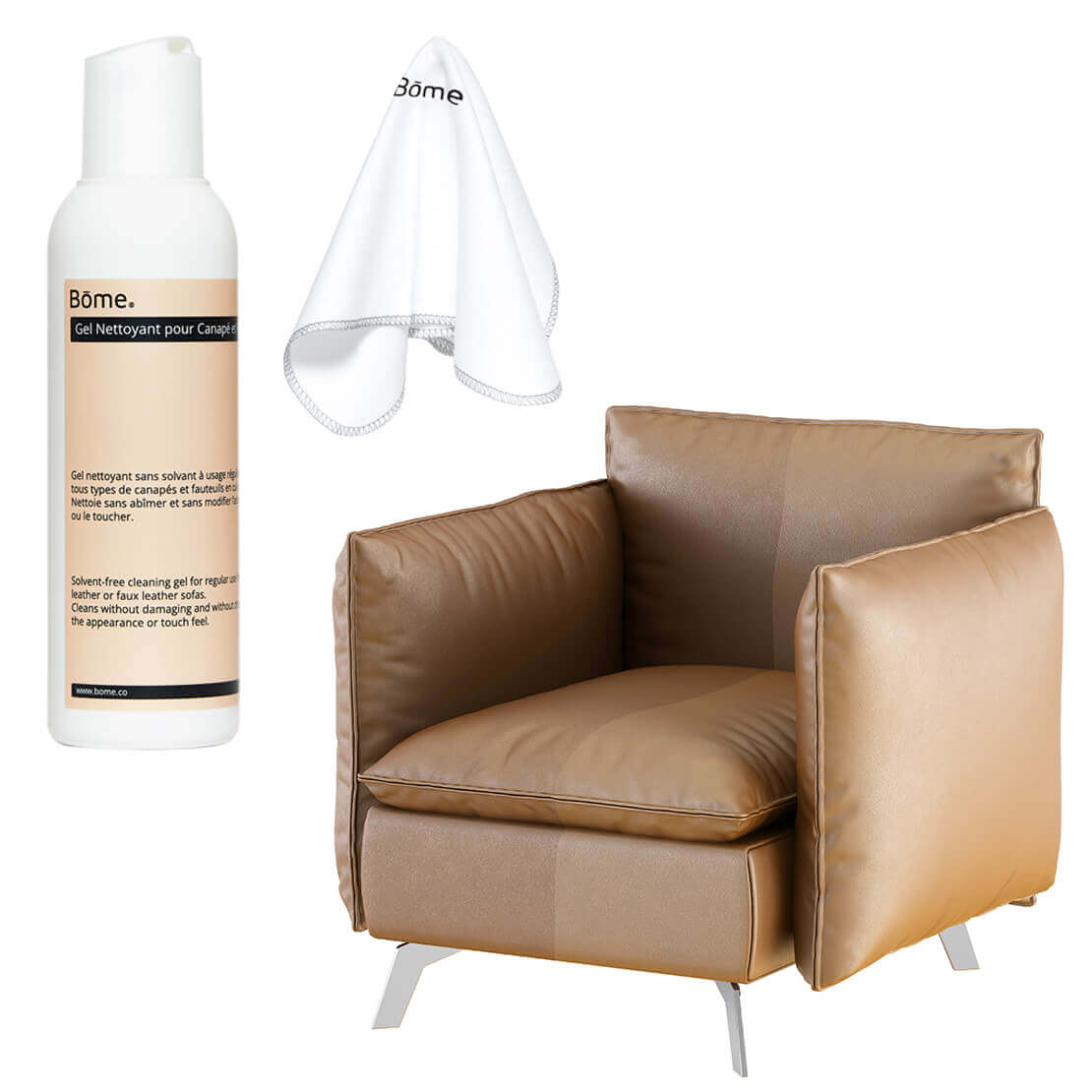
Clean (with the foam)
In the second case, i.e. for spot cleaning and deep cleaning, we recommend using the foam scrubber.
First, dust the surface with your cleaning brush, then apply the foam directly to your cleaning brush. Start brushing the leather energetically with the sofa cleaner to create a shampoo.
The foam will remove stains and dirt accumulated over time by mixing with it. The foam should then change color from white to a darker color. That is a sign that the product is capturing all the dirt.
The bristles of the brush are made of boar bristle, and the formula of the foam is free of any solvents, so you can brush vigorously without damaging the leather surface of your sofas and chairs.
When the foam no longer changes color, use the wiping cloth to remove the foam. By removing the foam residue you leave the leather perfectly clean. No rinsing is required for this product. Using the Bōme wiping towel designed to be particularly absorbent allows the entire product to be removed in just a few seconds.
The leather cleaner used will restore the leather's soft, matte appearance after it has been polished over time or the use of the wrong products.
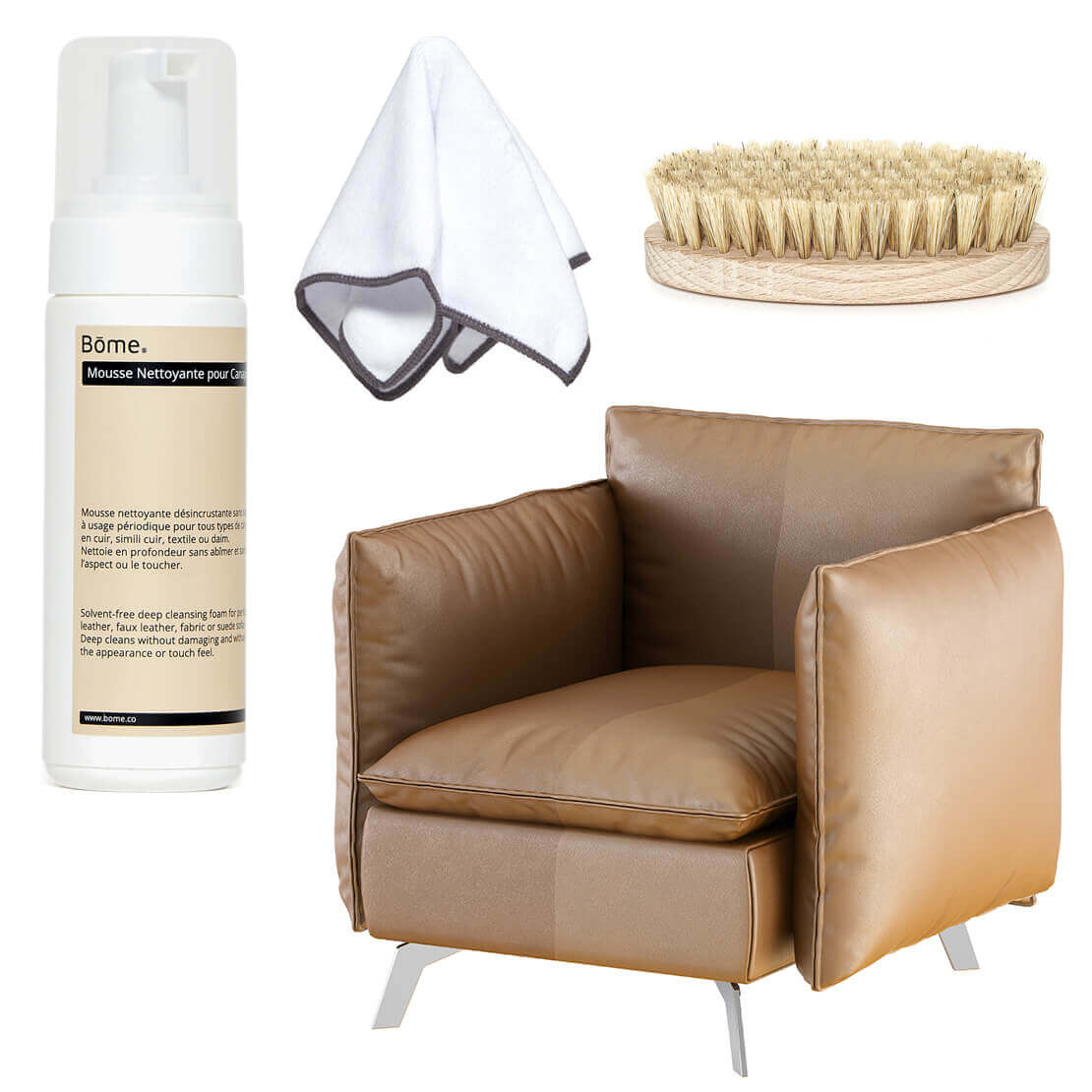
Renovate the color (optional)
Whether your sofa or armchair is a pigmented leather or a more natural finish, you can see color defects due to wear.
For pigmented leather, this means that the covering and pigmented film is damaged.
If it is a natural leather, then it means that it is simply discolored.
In both situations, it is possible to restore the color with renovation milk. In the case of pigmented leather, the renovation milk does not restore the degraded material. It only allows the uncovered surface to be tinted to obtain a uniform color. It is, therefore, a renovation of the leather of your sofa or armchair.
Take a small amount of the renovation milk in the same color as your sofa and place it on a chamois cloth.
Apply the renovator to the areas to be treated and massage the product into the leather.
When the leather is recolored, remove any product residues remaining on the surface using a clean part of the chamois. We advise you to let the product dry for a few minutes before proceeding with the protection.
Important: to avoid color transfers after drying the renovation milk, you must carry out this step between cleaning and protecting your leathers.
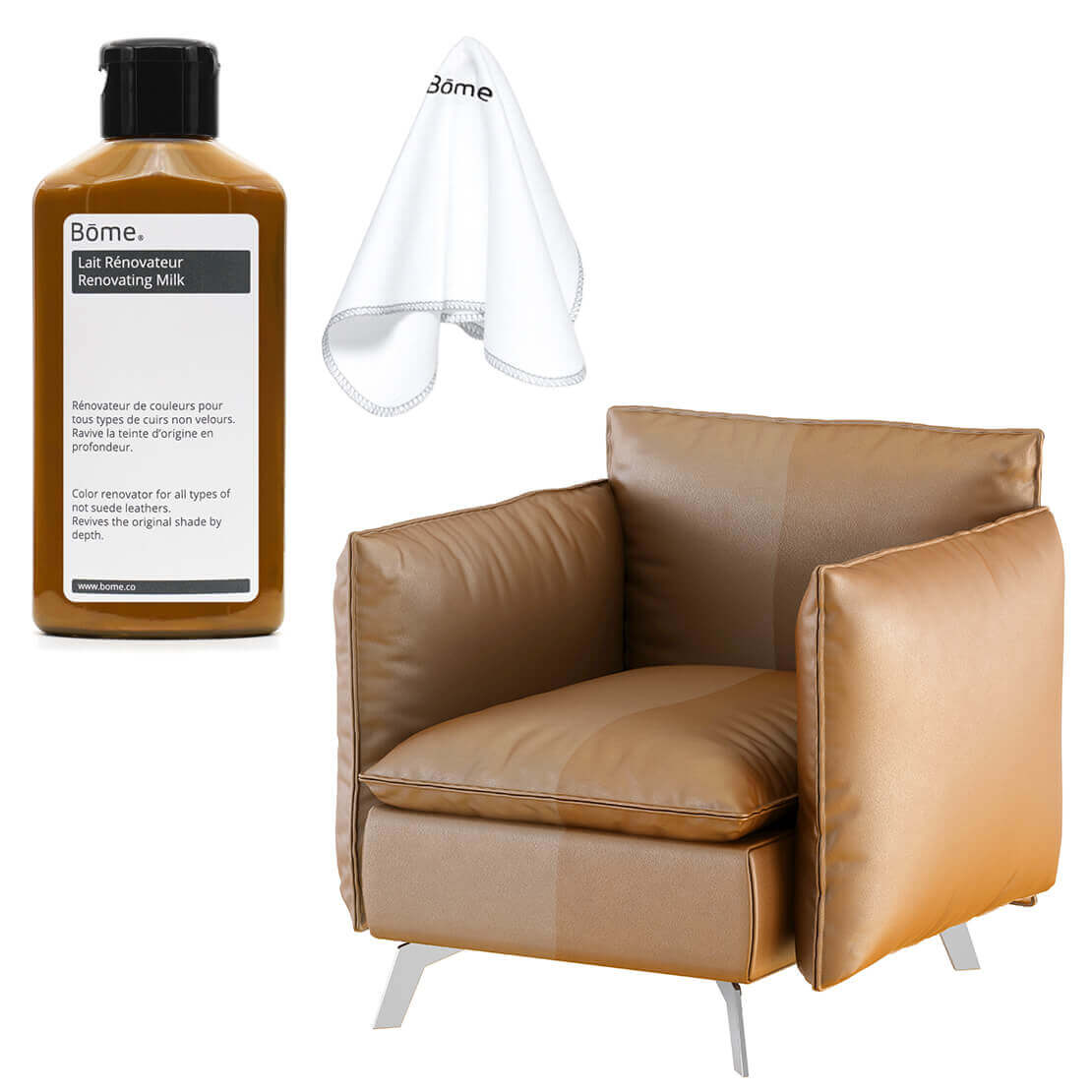
Protect
The protection has a specific purpose depending on the type of leather of your sofa.
In the case of pigmented leather (which absorbs little or no product), the protective gel leaves a light protective film. This film prevents stains from becoming embedded and therefore they can be removed more easily during the next maintenance.
In the case of leather with natural or aniline finishes (leathers that absorb easily), the protective gel nourishes the leather. It acts like shoe polish. In addition, it protects by filling in the pores of the leather that have been opened up by the application of a sofa cleaner.
To achieve both objectives, you must not alter the new appearance of the leather recovered thorough cleaning.
Pour a small amount of protective gel onto your polishing cloth and apply the protector to the entire surface to be treated.
In the case of pigmented leather, a small amount of product is obligatory. You only need to leave a light film on the surface.
Unlike more natural leather where you need to saturate the leather. When the leather is saturated, wipe off any gel residue remaining on the surface.
In the case of a color renovation of the leather of your sofa, the protection step will allow you to remove the excess color which is not fixed on the material. This step is crucial and allows you to avoid color transfers on your clothes.
This protection step, although necessary, must not alter the new appearance obtained during cleaning. When you touch the leather of your sofa, if you notice a difference, there is too much protective gel on the surface. To remove the excess, we recommend using a clean part of the polishing cloth to wipe more of the area treated with the protective gel.
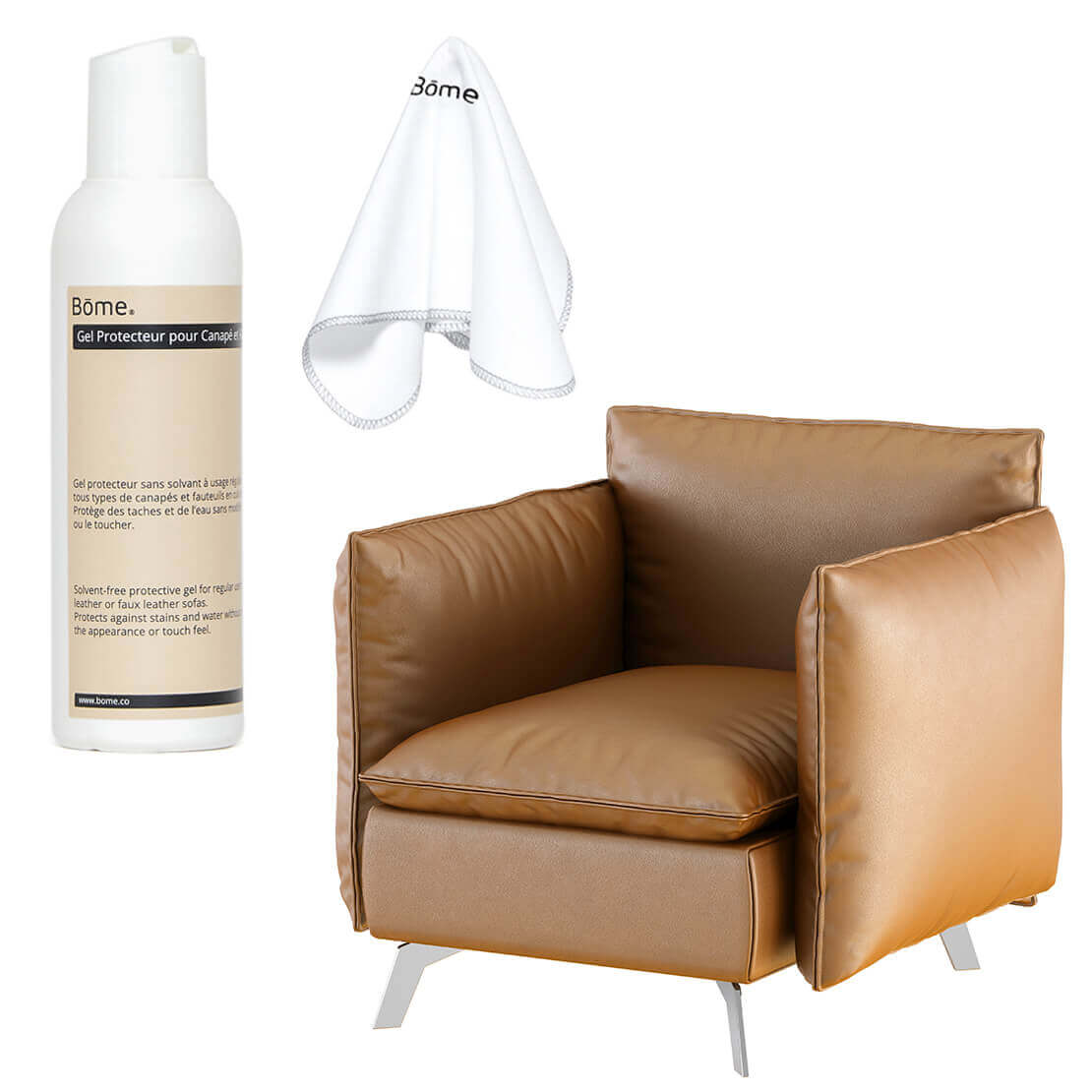
Results
At the end of the maintenance and renovation, the leather of your sofa should look new in every respect. If the original leather was matt, you get the soft feel of the leather again.
We have designed all these products to be used as many times as needed. They are formulated to be safe for your sofa leather, whether it's beige, black, or any other color. By following our recommendations, you will keep your leather sofa clean. It will also be protected against future stains without having to change its look or feel.
